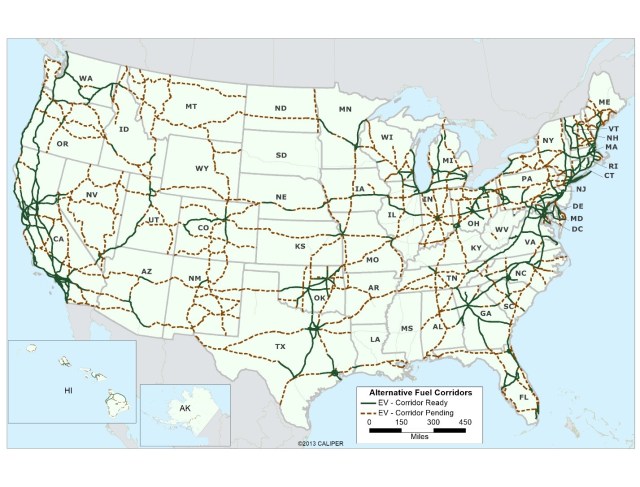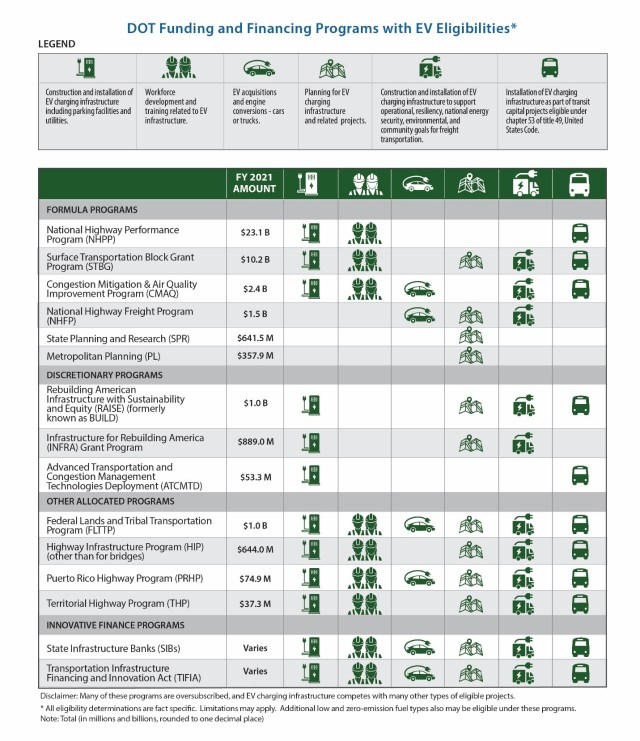FACT SHEET: Biden Administration Advances Electric Vehicle Charging Infrastructure
Department of Transportation, Department of Energy, and General Services Administration Announce New Actions to Accelerate Deployment of Electric Vehicles and Chargers
Today, the White House announced new progress on the Administration’s goal to accelerate and deploy electric vehicles and charging stations, create good-paying, union jobs, and enable a clean transportation future. This includes actions by federal agencies:
- The Department of Transportation announced guidance on how grants can be used to deploy charging infrastructure and newly designated alternative fuel corridors;
- The Department of Energy announced new funding and partnerships for charger-related research and development; and
- The General Services Administration announced progress on the goal to transition the federal fleet to zero-emission vehicles.
In March, the United States passed the milestone of 100,000 public chargers (as recorded by the Department of Energy’s Alternative Fuel Data Center) and these new actions will accelerate deployment to make driving an electric vehicle convenient in every part of the country.
To discuss today’s announcements, National Climate Advisor Gina McCarthy and Transportation Secretary Pete Buttigieg visited new, fast-charging facility near Union Station in Washington, DC. The charging stations were installed by an American-based company EVGo and enable EV users to recharge rapidly when away from home.
Most electric vehicle drivers will charge at home and work. One of the perks of driving an electric vehicle is never needing to go to the gas station. But public charging infrastructure will provide a key role for people without off-street parking and for longer trips. A robust, convenient, and affordable network of public chargers will increase confidence for drivers that they will always have a charging option when they need it.
President Biden’s American Jobs Plan includes a transformational $15 billion investment to fund this vision and build a national network of 500,000 charging stations. Through a combination of grant and incentive programs for state and local governments and the private sector, it will support a transformational acceleration in deployment of a mix of chargers in apartment buildings, in public parking, throughout communities, and as a robust fast charging along our nation’s roadways.
Charger installation and maintenance creates good-paying, union jobs right here in America that cannot be outsourced, and the American Jobs Plan also includes incentives to bring more charging equipment manufacturing to the United States. Every element of the plan will promote strong labor, training, and installation standards. The Biden Administration is committed to promoting high quality jobs, fair wages, and safe working conditions through its investments. This means holding both public and private recipients of federal funding accountable to create and support good middle-class jobs. Industry, unions, state, and local governments, higher education institutions like community colleges, and nonprofits will need to work together to prepare workers for the job opportunities these investments will create.
Supporting a Nationwide Charging Network
- Today, the Department of Transportation announced the 5th round of “Alternative Fuel Corridors” designations. This program, created by the FAST Act in 2015, recognizes highway segments that have infrastructure plans to allow travel on alternative fuels, including electricity. The first four rounds of designations included portions of 119 Interstates and 100 US highways and state roads. Round 5 includes nominations from 25 states for 51 interstates and 50 US highways and state roads.
- The cumulative designations (Rounds 1-5) for all fuel types (electric, hydrogen, propane, natural gas) include 134 Interstates and 125 US highways/State roads, covering almost 166,000 miles of the NHS in 49 States plus DC. Of that total, the FHWA has designated EV corridors on approximately 59,000 miles of the NHS in 48 States plus DC. South Dakota and Mississippi are the only two states without an EV corridor designation.

- The DOT also issued a new report clarifying how its programs can be used for EV charging infrastructure. Many existing programs have this as an eligible use and this guidance can expand how many funded entities take advantage of that. This could increase the use for EV charging infrastructure of $41.9 billion in federal grant funding in 15 specific programs.

Technology and Business Model Innovation
- The Department of Energy announced new research funding opportunities on three EV charging related topics:
- $10 million to research, develop, and demonstrate innovative technologies and designs to significantly reduce the cost of electric vehicle supply equipment for DC Fast Charging that will be needed in large number to support high volumes of EVs.
- $20 million to accelerate the adoption of commercially-available plug-in electric vehicles (PEVs) and supporting infrastructure through community-based public-private partnerships that demonstrate PEV technologies (for cars, buses, school buses, trucks) and infrastructure in various innovative applications and share resulting data, lessons learned and best practices with a broader audience. Projects that demonstrate the ability to accelerate clean energy jobs or provide new electric transportation solutions to under-served communities are of interest.
- $4 million to encourage strong partnerships and new programs to increase workplace charging regionally or nationally which will help increase the feasibility of PEV ownership for consumers in underserved communities (e.g., demographics that currently have minimal access to home charging).
- DOE and the Electric Power Research Institute (EPRI) also announced a national EV charging technical blueprint including fast charging and grid interaction. This blueprint will assess needs in terms of connectivity, communication, protocols from utility down to vehicle, to support electrification of the full vehicle fleet.
- DOE announced that Idaho National Laboratory (INL) is partnering with global and domestic Automakers to analyze anonymous vehicle charging data that describe market-level trends of operation and charging behavior for a large sample of U.S. consumer EVs. To guide this work, DOE, INL, and Automakers formed a working group to provide feedback on INL analysis and modeling efforts.
Progress on Federal Leadership
- The Council on Environmental Quality and the General Services Administration are announcing early progress in response to the Executive Order directing the federal government to transition to a zero-emission vehicle (ZEV) fleet. Since inauguration day, the administration has acquired more ZEVs than in the whole previous fiscal year. Additionally, we are on track to triple the number of total ZEVs added to the fleet this year compared to last. Installing EV charging infrastructure at federal facilities is a key component of the transition to a zero-emission fleet.
These actions are a set of initial steps on the path the President’s goal of a national network of 500,000 chargers to support convenient and affordable travel by drivers of zero emission vehicles across the whole country.
###

